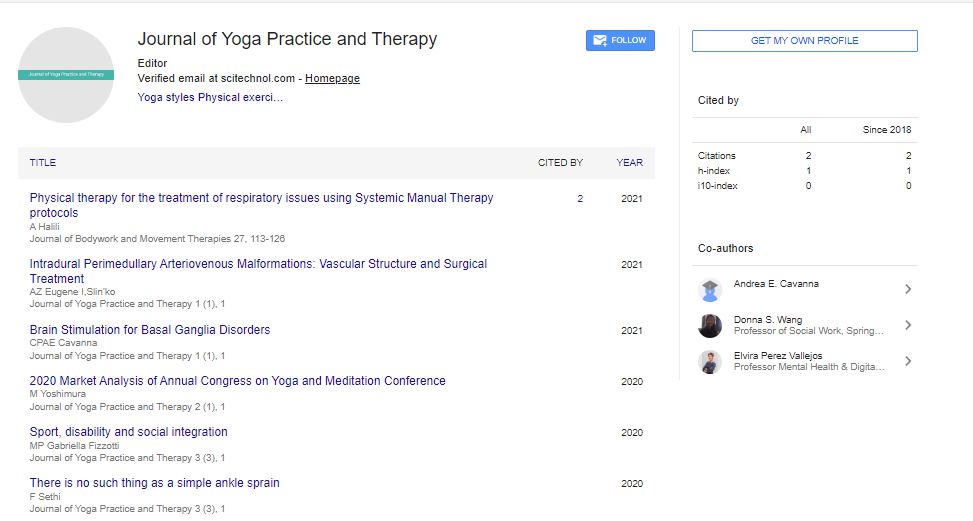Perspective, J Yoga Pract Ther Vol: 6 Issue: 2
The Transformative Power of Yoga Practice: Developing Mind, Body, and Spirit
Chihiro Yamamoto*
1Department of Yoga Philosophy, University of Cape Town, Cape Town, South Africa
*Corresponding Author: Chihiro Yamamoto,
Department of Yoga Philosophy,
University of Cape Town, Cape Town, South Africa
E-mail:yamamoto.chihiro@
gmail.com
Received date: 29 May, 2023, Manuscript No. JYPTY-23-107040;
Editor assigned date: 31 May, 2023, PreQC No. JYPTY-23-107040 (PQ);
Reviewed date: 14 June, 2023, QC No. JYPTY-23-107040;
Revised date: 21 June, 2023, Manuscript No. JYPTY-23-107040 (R);
Published date: 28 June, 2023, DOI: 10.4172/jypty.1000122
Citation: Yamamoto C (2023) The Transformative Power of Yoga Practice: Developing Mind, Body, and Spirit. Int J Yoga Therap 6:2.
Description
Yoga, an ancient practice that originated in India, has transcended time and geography to become a global phenomenon. Beyond being a physical exercise, yoga encompasses a holistic approach to well-being, nurturing the mind, body, and spirit. The transformative power of yoga lies in its ability to develop a harmonious connection between these aspects of self, leading to a profound sense of inner peace, physical vitality, and spiritual growth.
Cultivating physical strength and flexibility
The physical aspect of yoga, represented by various yoga asanas (poses), is often the first association that comes to mind. These asanas engage different muscle groups, helping to build strength, improve flexibility, and promote overall physical health.
Through regular practice, individuals gradually notice increased ease in performing asanas that once seemed challenging. Improved flexibility not only enhances physical performance bu
Yoga asanas also activate the parasympathetic nervous system, the body's relaxation response, reducing stress and promoting a state of relaxation. By cultivating physical strength and flexibility, yoga allows individuals to move with grace and ease, fostering a deeper connection between the body and mind.
Connecting breath and mind through pranayama
Pranayama, the practice of breath control, is an integral part of yoga. Breathing consciously and deeply has a transformative effect on the mind, fostering mental clarity, focus, and relaxation.
Through pranayama techniques such as nadi shodhana (alternate nostril breathing) and ujjayi breathing (victorious breath), practitioners can regulate their breath and calm the mind. Deep, mindful breathing reduces stress hormones, lowers blood pressure, and induces a sense of calmness.
As individuals develop a deeper awareness of their breath, they become more attuned to the present moment, embracing mindfulness and gaining control over their thoughts and emotions. The connection between breath and mind forms the foundation for inner peace and emotional stability.
Cultivating mindfulness through meditation
Meditation is a fundamental aspect of yoga practice that encourages individuals to observe their thoughts and emotions without judgment. By entering a state of deep concentration and self-awareness, practitioners cultivate mindfulness.
Regular meditation fosters mental clarity and reduces the tendency of the mind to wander. As individuals become more grounded in the present moment, they gain insight into their thought patterns and emotional responses, empowering them to make conscious choices in their daily lives.
Mindfulness extends beyond the meditation cushion, influencing how individuals approach challenges and interact with others. Through a mindful lens, people can embrace each moment fully, leading to a greater appreciation of life's simple joys.
Uniting body, mind, and spirit
The true transformative power of yoga lies in its capacity to unite the body, mind, and spirit, harmonizing these aspects of self into a cohesive whole. As practitioners progress on their yoga journey, they discover that physical movements and breath work serve as gateways to a deeper understanding of their inner selves.
The integration of asanas, pranayama, and meditation provides a profound sense of self-awareness and inner alignment. Individuals begin to recognize that their thoughts and emotions are intricately linked to their physical sensations and movements.
This unity allows individuals to access their innate wisdom, connecting with their authentic selves and fostering a deep sense of self-acceptance and self-love. The journey of self-discovery through yoga is transformative, leading to a profound shift in perspectives and priorities.
Embracing spiritual growth
Beyond the physical and mental benefits, yoga offers a spiritual dimension that transcends the material world. While yoga is not tied to any specific religion, it embraces universal spiritual principles that honor interconnectedness, compassion, and gratitude.
Through yoga practice, individuals develop a sense of reverence for life and the world around them. They begin to recognize that their journey is part of a larger tapestry, aligning with a higher purpose or source of inspiration.
For some, this spiritual growth manifests as a deepening of their existing faith, while others may experience a broader sense of spirituality that transcends religious boundaries. Regardless of the path, yoga encourages individuals to cultivate qualities such as kindness, empathy, and authenticity.
Conclusion
The transformative power of yoga practice lies in its ability to nurture the mind, body, and spirit, developing a harmonious connection within the self. As individuals progress on their yoga journey, they develop physical strength, flexibility, and relaxation through asanas and pranayama. Meditation fosters mindfulness, enhancing mental clarity and emotional stability.
Ultimately, the unity of body, mind, and spirit allows individuals to embrace their true selves and align with their inner wisdom. This spiritual growth leads to a deep sense of purpose and interconnectedness, transcending the physical realm.
As more people embrace yoga as a way of life, its transformative potential continues to inspire positive change and personal growth in individuals and communities worldwide. Through yoga practice, individuals can unlock their potential for self-discovery, inner peace, and a life of purposeful transformation.
 Spanish
Spanish  Chinese
Chinese  Russian
Russian  German
German  French
French  Japanese
Japanese  Portuguese
Portuguese  Hindi
Hindi 